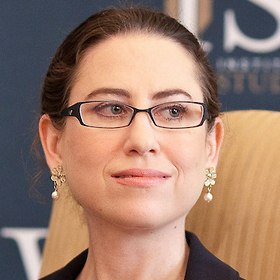The Challenges of the Middle East
Understand the Arab Spring and how, together with its aftermath, it has changed American priorities and strategies.
Summer 2016
Washington, DC
Nothing in American foreign policy is more controversial than President Obama’s efforts to contain Iran’s nuclear program. In April 2015, after a marathon negotiating session in Lausanne, Switzerland, the debate entered a new phase when the United States and its negotiating partners (the so-called P5+1) and Iran announced a breakthrough. The Obama administration and its supporters claim that the agreement will severely restrict the Iranian nuclear program for at least a decade. In their more optimistic moments, they go even further, arguing that the deal will lead to an historic reconciliation between the United States and the Islamic Republic. Meanwhile, the framework’s detractors depict it as an abject capitulation that has weakened the United States and its regional allies.
Whether you side with the Obama administration or its critics, the deal is colored by your understanding of the Iranian threat. One school of thought argues that the Islamic Republic is essentially a defensive power whose days are numbered. In these, its twilight years, it can easily be contained. If the United States and its ally, Israel, will simply avoid rash military action, so the thinking goes, then they will certainly prevail over Iran in the long run. Alternatively, a second school of thought sees Iran as an offensive power. Harboring hegemonic regional ambitions hell-bent on acquiring a nuclear weapon, Iran poses a serious danger to regional order, not to mention American primacy. Countries threatened by the Iranian nuclear program, so this school claims, will inevitably acquire their own arsenals. The Persian Gulf, which contains two-thirds of global oil reserves, will become the focal point of a multi-sided nuclear standoff.
After a brief survey of the historical background, this seminar will investigate the Iran debate in depth and will conclude, on the last day and a half, with a war game.
Images courtesy U.S. Department of State | Federal Ministry for Europe, Integration and Foreign Affairs
Mike Doran on the Nuclear Deal with Iran

Michael Doran, an expert in U.S. policy toward the Middle East, radical Islam, and the Arab- Israeli conflict, is a Senior Fellow at the Hudson Institute in Washington, DC. He has also held a number of senior U.S. government posts related to Middle East policy and strategic communication.

Michael Doran is a Senior Fellow at the Hudson Institute in Washington, DC. He specializes in Middle East security issues.
In the administration of President George W. Bush, Doran served in the White House as a senior director in the National Security Council, where he was responsible for helping to devise and coordinate United States strategies on a variety of Middle East issues, including Arab-Israeli relations and U.S. efforts to contain Iran and Syria. He also served in the Bush administration as a senior advisor in the State Department and a deputy assistant secretary of defense in the Pentagon.
Before coming to Hudson, Doran was a Senior Fellow at the Brookings Institution. He has also held teaching positions at NYU, Princeton, and the University of Central Florida. He is the author of Pan-Arabism before Nasser, which analyzes the first Arab-Israeli war as an inter-Arab conflict, and Ike’s Gamble: America’s Rise to Dominance in the Middle East, about President Eisenhower and the Middle East. He appears frequently on television, and has published extensively in Foreign Affairs, The American Interest, Commentary, Mosaic Magazine, The Wall Street Journal, The Washington Post, and The New York Times.
Born in Kokomo, Indiana, Doran went to elementary school in Carmel, outside of Indianapolis, before his family moved to Fullerton, California, where he graduated from Sunny Hills High School. He received a B.A. from Stanford and an M.A. and Ph.D. in Near Eastern Studies from Princeton.
Readings:
Discussion Questions:
Readings
Discussion Questions:
Readings
Discussion Questions:
Readings
Discussion Questions:
During the last hour of class on Thursday you will be presented with a scenario depicting the United States in a nuclear crisis with Iran. The class will divide into two groups—hawks and doves. Both groups will be called upon to defend their positions before the President in a model National Security Council meeting on Friday.

Michael Doran
Michael Doran, an expert in U.S. policy toward the Middle East, radical Islam, and the Arab- Israeli conflict, is a Senior Fellow at the Hudson Institute in Washington, DC. He has also held a number of senior U.S. government posts related to Middle East policy and strategic communication.
Ray Takeyh
Ray Takeyh is Hasib J. Sabbagh senior fellow for Middle East studies at the Council on Foreign Relations (CFR). His areas of specialization are Iran, political reform in the Middle East, and Islamist movements and parties. Prior to joining CFR, Takeyh was senior advisor on Iran at the Department of State.

Lewis Libby
Lewis Libby is Senior Vice President of Hudson Institute. Before joining Hudson, Libby held several high level positions in the federal government related to his current work on national security and homeland security affairs.

Paul Wolfowitz
Paul Wolfowitz is a scholar at the American Enterprise Institute. He spent more than three decades in public service and higher education. Most recently, he served as president of the World Bank and deputy secretary of defense.

John R. Allen
John R. Allen is President of the Brookings Institution and a retired U.S. Marine Corps four-star general. He previously served as commander of the International Security Assistance Force in Afghanistan and special presidential envoy to the Global Coalition to Counter ISIL.

James M. Dubik
LTG James M. Dubik (U.S. Army, Ret.) is a Senior Fellow at the Institute for the Study of War and a Professor at Georgetown University’s Security Studies Program. General Dubik has extensive operational experience in Iraq, Afghanistan, Japan, Korea, Thailand, Bosnia, Haiti, Panama, Honduras, and in many NATO countries.

Frederick W. Kagan
Frederick W. Kagan is a Senior Instructor with the Hertog War Studies Program at the Institute for the Study of War. The author of the 2007 report “Choosing Victory: A Plan for Success in Iraq,” he is one of the intellectual architects of the successful “surge” strategy in Iraq. He is the director of AEI’s Critical Threats Project.

Kimberly Kagan
Kimberly Kagan is a Senior Instructor with the Hertog War Studies Program and founder and president of the Institute for the Study of War. She is a military historian who has taught at the U.S. Military Academy at West Point, Yale, Georgetown, and American University.